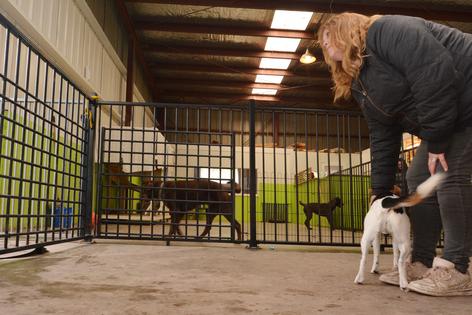My Pet World: Choosing a kennel after your dog is injured at one of them
Dear Cathy,
We have an eight-year-old 50-pound whippet/German Shepard mix who is very smart and has a wonderful personality. Last summer, we boarded her for a week at a dog kennel. She had been there before with no issues. When we picked her up, it was obvious that another dog had attacked her. The kennel owner denied this, but two independent veterinarians agreed that her injuries were from a dog attack. They treated her with antibiotics and were especially concerned about an eye injury. We were equally concerned about her spirit, which needed months to get back to her usual confidence.
We are traveling in a few weeks and cannot locate anyone to dog-sit her. We made reservations for her at a different kennel but are very worried that this arrangement might set her recovery back. Any ideas? — Marge, Riverhead, New York
Dear Marge,
I am sorry to hear about your dog’s injury. Dogs, even social dogs, can get into tussles with each other, especially in unfamiliar surroundings and with none of their family around. The problem is, the kennel should have been owned up to what happened.
Ideally, it would be great to find someone to stay at your house with her. If you have no choice though, I want to familiarize you with the four main types of kennels that you can choose from these days and then make suggestions on what to do for her.
Traditional kennels provide basic services, including a fenced kennel space, an exercise run, dog walking options, and temperature-controlled environments. Dogs don’t generally interact with each other. Kennels with day care options give the more social dog some off-leash playtime with other dogs. These kennels usually require a temperament test before a dog can be kenneled at the facility. Veterinary clinics may board pets in their clinic or operate a separate kennel facility. Veterinary boarding kennels generally don’t have a lot of bells and whistles, but they are great for dogs and cats who may need a veterinarian to check in on them. They also tend to restrict interaction between pets.
Finally, whether they are called resorts, hotels, camps, farms, spas, or doggy B&B’s, these upscale facilities offer extended amenities. Dogs can take nature walks, get massages, exercise in swimming pools, sign-up for group playtime, or brush up on obedience skills, depending on what you choose and can afford. They may have televisions and couches in their “rooms,” mimicking the modern dog’s home life. These facilities often have cameras so you can check on your dog via the internet throughout her stay. While interaction with other dogs is optional, they often require a temperament test as well.
My suggestion is to visit several kennels and ask them many questions about how they care for the dogs and how the other dogs interact (or don’t interact) with each other. Share your dog’s story with the kennel manager or owner. Don’t reveal which kennel it was or go into detail as to what the kennel did or didn’t do. Just explain what happened to your dog, so they can give her some extra “TLC” when she is there.
Once you find a kennel you like, plan for her to spend at least one night there before your trip. If she seems OK after one night, then she will probably be OK for the weeklong stay at that particular kennel.
...continued
(c) 2021 DISTRIBUTED BY TRIBUNE MEDIA SERVICES, INC.










